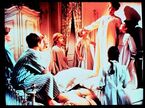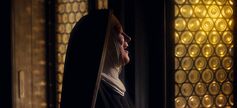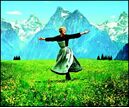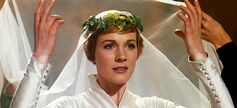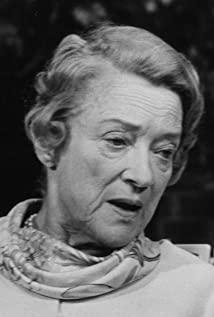Immediately after its release, "The Sound of Music" became world-famous, and its attendance rate was enduring, even breaking the previous Hollywood record of "Gone with the Wind" with the highest attendance.
The film is based on Maria Augusta Trapp's autobiographical novel of the same name, and only uses certain events and details from the first part of the novel. It can be said that the film has been completely recreated. Nevertheless, Maria in the film is still in line with the spirit of the character of the same name in the original book. The novel's first-person account of Maria's mischievous and deviant actions in the monastery provides the basis for the film's reckless, head-scratching comedic details. There are three pairs of contradictions in the film: one is the contradiction in the way of handling life between the Colonel, who applies strict military discipline to the daily life of the family, which is contrary to his natural nature, and Maria, who follows nature and makes life full of life. The other is the conflict between two different types of characters from the metropolitan salon, a baroness who has noble manners in the upper class and represents modern material civilization, and Maria who loves nature, is simple and innocent, and is full of childishness. Finally, there is the conflict between the Austrian people, including the nuns, and the Nazis, represented by the colonel. The three groups of contradictions and conflicts are subtly intertwined, and the story of Maria and the Colonel from conflict, conflict to heart-to-heart love is the main line, reflecting the joy of human nature getting rid of artificial constraints, the victory of natural beauty over pretentious beauty, truth, goodness and beauty Contrast with fake and ugly. The conflict between the colonel and Maria culminates in the scene where the boat capsizes. However, the colonel was a straight-forward man who used a whistle to direct his children's actions. He would absolutely not tolerate the actions of the children who climbed from the water to the shore, and the actions of Maria in the lead. embarrassing. It was the sailor-like discipline of the children that he thought he could boast to the baroness (the children lined up in the garden to meet them), and his anger could be imagined when such a group of "stragglers" appeared unexpectedly. He went to Vienna and Maria destroyed his discipline! The Colonel's whistle blew again, "Stand at attention", and the atmosphere immediately became tense. But the more serious the Colonel was, the more amusing and comical the audience felt. Because the contrast formed by this momentary change is too stark. The next scene is a tit-for-tat argument between the colonel and Maria. Maria won't give in an inch. How can the colonel's self-esteem tolerate such a scolding from the governess. But the children's chorus of "The Sound of Music" taught him an immediate lesson, and he defied the notion that discipline was paramount. Life is supposed to be joyful and natural. The colonel's discipline of restraining himself and others was finally broken by Maria. The baroness is not only beautiful, but also very educated; in terms of family property, it is her proud capital. In social situations, she is free to deal with it; but in maria In front of her, she seemed so weak and unconfident that she went from being wary to trying to get him to return to the convent as a nun. The baroness's predominance in Vienna, in the salon, seems out of place once she is placed in the realm of nature. The scene of her passing the ball with the children made the audience laugh. The children found it tedious to play with her. Lizel threw a ball, and she almost fell and was embarrassed. The audience naturally wanted to compare her to Maria. The lady frowning, of course, is ridiculous. But mostly laugh at her pretentious affection for her children (she was planning to send them to boarding school). In the scene where the colonel keeps his eyes on Maria in the moonlight from the balcony, the baroness brags about her wealth by giving wedding gifts and honeymoons. However, her wealth was at a disadvantage compared to Maria's wealth. The colonel apologized frankly that they could not get married. The baroness has returned to Vienna. She lost the fight with Maria.
As for the conflict between the colonel and the Nazis, most of the front of the whole film uses casual brushwork, which is touched by chance, and only enters the positive description in the last few scenes. Despite this, the film has always carried out a contrast between the good and the beautiful and the false and ugly. For example, the housekeeper Hans, who has not exposed his Nazi identity for the time being, was sneaky when they met and exchanged information with Ruff; Ruff wanted to find Lizel when the colonel found him, and gave a Nazi salute in a panic, revealing his ugliness; The Lord's righteous counterattack was a stark contrast. The film also uses the Austrian flag as the solemn ornament of the Colonel's home dance and the contrast of the Colonel tearing up the Nazi flag at the door of his house to show the Colonel's love-hate attitude. The last few scenes are concert hall performance scenes and chase scenes. The Colonel's family performed with the enemy on guard and Zell in the audience. Zell stared at him and was full of hostility; while the moving singing of the colonel's family resonated with the feelings of the Austrian compatriots in the field. When the colonel led the audience to sing "Wild Chrysanthemum", the warm atmosphere reached its peak. This atmosphere shows yearning for a better life, love for the motherland, and contempt for the Nazis. But Zell deceived himself, thinking that the concert would show that after the Nazi annexation of Austria, the world was still peaceful. So the warmer the atmosphere, the more isolated he became among the broad masses of the people. Here the contrast between the good and the beautiful and the false and ugly has been extended to the contrast between the vast number of people who love the good life and the small group of destroyers of peaceful life. In the chase scene, the Nazis were extremely vicious, and the little Nazi Ruf was stubborn, but he was stern. Facing Luff's muzzle, the colonel approached him calmly, step by step, snatching his pistol as he persuaded him. In contrast, how far apart the mental states of the two are! In this struggle, the nuns also "committed" the "crime" of secretly removing engine parts of Nazi cars, stood on the side of "good" and fought against "evil".
The film's depiction of nature does not hesitate to spend a long time on film. The beginning of the film uses extremely long shots to capture clouds, snow-capped peaks, eerie canyons, mirror-like lakes, peaceful villages, solemn churches, and emerald green. On the top of the mountain, until the top of the mountain, a girl Maria, who is integrated with the beautiful scenery of nature, appears. She sang melodiously and melodiously, singing "The Sound of Music", singing praises to the beautiful nature. At the end of the film, the colonel's family escaped the pursuit of the fascists, climbed the Alps, climbed the snow-capped peaks, and returned to nature at the end. In the music of "Climbing Every Mountain", their family traveled over mountains and mountains, trekking mountains and rivers, looking for a free world full of love.
The song and dance of the film vividly portrays the characters and participates in the development of the plot. The theme song "The Sound of Music" at the beginning is undoubtedly Maria's voice. And the song "Maria" sung by the nuns and the abbot, depicts Maria with mixed praise and criticism, depicting her as cute and helpless, equivalent to a narration. Maria came out of the monastery, feeling both elated for the freedom outside the monastery and timid about the future; so she cheered herself up by singing "I Know I'm Full of Confidence" along the way, which is equivalent to an inner monologue. The film uses the above three songs to describe Maria's character and completes the initial task from the play. In the Night of Thunder Maria teaches the children to sing "The Thing I Love," a scene that shows the rapport the children begin to develop with her. Then in the popular song "Duo,  In the sound of ", Mi", a series of cutscenes such as hiking and picnics flashed, and the music and pictures were used to lay out the emotional development between her and the children through various activities to the level of mutual harmony, and the changes in this way were precisely the A taboo for the disciplined colonel. The combination of music, dance moves and images here not only entertains the audience, but also serves as a dramatic factor that drives the conflict between Maria and the Colonel's personalities. When the conflict between Maria and the Colonel reached its peak, the lyrical tune of "The Sound of Music" sung by the children suddenly floated, and the conflict was resolved logically. The family puppet show "The Lonely Shepherd", performed by Maria and the children, brought the newly formed harmonious atmosphere into a warmer and more lively one, and continued to play a role in paving the way for changes in the relationship between the characters. The colonel was willing to break the long-standing habit of keeping his mouth shut and sang "Wild Chrysanthemum", which seemed logical. The Colonel's "Wild Chrysanthemum" was unconsciously dedicated to Maria in front of the baroness. When the colonel gave the baroness a grand party, the real drama unfolded in the garden. The duet between the colonel and Maria revealed the secrets of their hearts. "Goodbye", which added splendor to the party, was a wonderful program for the children to say goodbye to the guests of the party, but in the play it laid the groundwork for the Trapp family to escape from Austria. As for Maria and the colonel's love in the garden, "Good things are rewarded", it is a matter of course to announce the end of love. Another feature of the music in the film is the magic of song repetition. The song "The Sound of Music" appears many times, and each appearance has a different effect. The third time, after Maria left without saying goodbye, when the children were rehearsing, they sang slack, exaggerating that they were no longer used to lacking Maria, and the colonel was at a loss. The second time the song "My Favorite Things" appeared was when the children went to the monastery to be rejected by Maria and had no choice but to show that it was impossible for the children to "forget their sorrows" without Maria. At Maria's wedding, the nuns sang "Maria" again, symbolizing that the girl who was like "walking clouds", "flowing water" and "bright like the moonlight" finally had a home and made Maria at this time and her image at the beginning of the film. In stark contrast, Maria has matured. Maria and the colonel returned from their honeymoon, and the eldest daughter Lizel confided to Maria what to do when there were ups and downs in love. At this time, Maria sang "You are sixteen and seventeen", comforting Lizel to wait for another year or two . This song is a continuation of "Sixteen to Seventeen" sung by Lizel on a stormy night and Luffy in the joy of their first love. take responsibility as a mother, and be a Very good mom. At the music festival, after the titled "The Sound of Music" and "Duo, , Mi", the colonel sang "Wild Chrysanthemum" again, her voice choked up; Maria hurriedly sang to cover up. The colonel motioned for everyone to sing together, so the singing of "Wild Chrysanthemum" echoed over the square, turning into a demonstration against fascism. When the final moment came, the Trapp family said goodbye to the audience, and also to Austria, with the song "Goodbye", which was very different from the lively and relaxed taste of the children at the ball when they said goodbye to their guests with the same song. The song and dance in the film "The Sound of Music" are organically integrated with the characters, plot and atmosphere, adding luster to the film.
View more about The Sound of Music reviews



